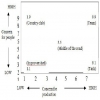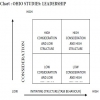Management Concepts & Organisational Behaviour - Organisational Power & Politics
Sources of Organisational Power
Posted On :
French and Raven’s Classification of sources of power includes reward power, coercive power, legitimate power, referent power and expert power. But sources of power are different from power bases.
Sources
of Organisational Power
French and Raven’s Classification of sources of power includes reward power, coercive power, legitimate power, referent power and expert power. But sources of power are different from power bases. This distinction is not maintained by French and Raven. How power holders control power bases speaks about sources of power. In other words, sources of power tell us wherefrom the power holders get their power bases. There are four sources of power, namely, position power (legitimate power), referent power (personal powers), expert power and opportunity power.
The source of position power is almost identical to authority. One’s structural position in the formal group or organisation enables access to power bases i.e., what the power holder has that gives him power. According to French and Raven this power stems from the internalized values of the other persons which give legitimate right to the power holder to influence them. In other words, others feel that they have obligation to accept this power. Again there are three major source of legitimate power.
-- One is prevailing cultural values of organisation or group which determine legitimacy. In orgnisational context, managers have legitimate power because employees believe in private property laws and in the hierarchy where persons holding higher positions wield power over lower position holders.
-- Second source of legitimacy is social structure. In an organisation, for example, when blue collar workers accept employment, they are in effect accepting its hierarchical structure and thereby granting legitimate power to their superiors.
-- Being designated as the representative of a powerful person or a group is a third source of legitimate power. A member of the board of directors or management committee is examples of this source. These sources of legitimate power create an obligation to accept and be influenced.
One’s personal characteristics can be a source of power. Articulation, domineering and charisma are personal characteristics that yield personal power. Others want to identify with a powerful person, regardless of consequences. In the organisational setting, a manger who depends on referent power must be personally attractive to his subordinates.
Expertise is the means by which the power holder controls specialized information. Others attribute knowledge and expertise to the power seeker. In a technology-oriented or knowledge society, expert power is one of the most powerful sources of influence. Credibility comes from having the right credentials, that is, the person must really know what he is talking about and be able to show tangible evidence of knowledge. Besides credibility, the person holding expert power must be trustworthy, that is, he must have reputation for being honest and straightforward.
Being in the right place at the right time can give a person the opportunity to gain power. One need not hold a formal position in an organisation to have access to information which others value most.
Besides these four sources of power, there is yet another source arising out of task-interdependence. Though a superior has legitimate power over subordinate, he must depend on the subordinate to get the job done correctly and on time. Hence the latter has power over the former due to task interdependency.
French and Raven’s Classification of sources of power includes reward power, coercive power, legitimate power, referent power and expert power. But sources of power are different from power bases. This distinction is not maintained by French and Raven. How power holders control power bases speaks about sources of power. In other words, sources of power tell us wherefrom the power holders get their power bases. There are four sources of power, namely, position power (legitimate power), referent power (personal powers), expert power and opportunity power.
Position Power
The source of position power is almost identical to authority. One’s structural position in the formal group or organisation enables access to power bases i.e., what the power holder has that gives him power. According to French and Raven this power stems from the internalized values of the other persons which give legitimate right to the power holder to influence them. In other words, others feel that they have obligation to accept this power. Again there are three major source of legitimate power.
-- One is prevailing cultural values of organisation or group which determine legitimacy. In orgnisational context, managers have legitimate power because employees believe in private property laws and in the hierarchy where persons holding higher positions wield power over lower position holders.
-- Second source of legitimacy is social structure. In an organisation, for example, when blue collar workers accept employment, they are in effect accepting its hierarchical structure and thereby granting legitimate power to their superiors.
-- Being designated as the representative of a powerful person or a group is a third source of legitimate power. A member of the board of directors or management committee is examples of this source. These sources of legitimate power create an obligation to accept and be influenced.
Personal Power or Referent Power
One’s personal characteristics can be a source of power. Articulation, domineering and charisma are personal characteristics that yield personal power. Others want to identify with a powerful person, regardless of consequences. In the organisational setting, a manger who depends on referent power must be personally attractive to his subordinates.
Expert Power
Expertise is the means by which the power holder controls specialized information. Others attribute knowledge and expertise to the power seeker. In a technology-oriented or knowledge society, expert power is one of the most powerful sources of influence. Credibility comes from having the right credentials, that is, the person must really know what he is talking about and be able to show tangible evidence of knowledge. Besides credibility, the person holding expert power must be trustworthy, that is, he must have reputation for being honest and straightforward.
Opportunity Power
Being in the right place at the right time can give a person the opportunity to gain power. One need not hold a formal position in an organisation to have access to information which others value most.
Other Sources of Power
Besides these four sources of power, there is yet another source arising out of task-interdependence. Though a superior has legitimate power over subordinate, he must depend on the subordinate to get the job done correctly and on time. Hence the latter has power over the former due to task interdependency.
Tags : Management Concepts & Organisational Behaviour - Organisational Power & Politics
Last 30 days 1558 views














